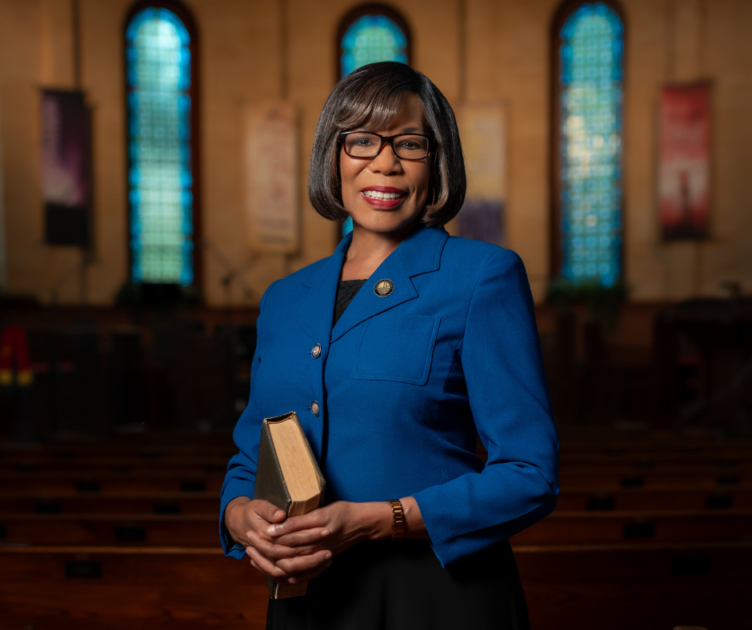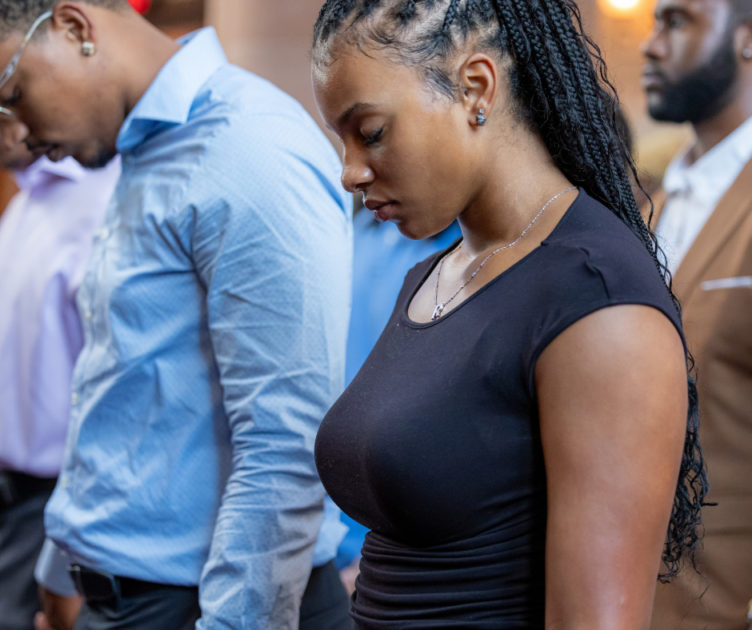By Rev. Dr. Debra Haggins, Inaugural Dean
Hampton University School of Religion
As the world adapts to a rapidly changing landscape, Hampton University has seen remarkable enrollment growth, executed strategic internal initiatives, and fortified its financial foundation—all while drawing strength from its deep-rooted legacy. In this era of transformation, Hampton University’s School of Religion stands ready to address the evolving educational and spiritual needs of today and tomorrow.

Hampton University’s School of Religion emerges as a bold and transformative force, blending the ancient rhythms of faith with the dynamic innovations of the modern world. In a realm where tradition meets transformation, this new venture stands as a place where hope, connectivity, and deep purpose are cultivated. More than a response to change, it is a bold step forward—nurturing leaders who are as grounded in timeless truths as they are equipped to navigate the complexities of a digital age. Through immersive programs, community-building, and a commitment to ethical leadership, Hampton offers a beacon of possibility for the faithful seeking purpose and progress.
Hampton University President Darrell K. Williams, acknowledging the institution’s rich history and foundational ties to religious principles, states, “Although we’re not a religious institution, it’s certainly a part of our fabric and our foundation. We see the development of the School of Religion as a natural progression. It’s not revolutionary. It’s, in fact, evolutionary.”
It’s widely known that Schools of Religion nationwide have encountered difficulties, even prior to COVID-19. These challenges include significant changes in student demographics, fewer students enrolling, internal disagreements worsened by ongoing issues, and, most notably, persistent financial troubles. Unfortunately, many schools have had to shut down while the need for quality religious education remains. One caveat of importance that we must reflect on is that while the pandemic led many institutions to consolidate programs or even shut down, the pandemic also led many to explore the deeper meaning of faith, life, religion, and spirituality as the world embraced a more digital approach to interconnectivity and community.
Historically Black Colleges and Universities pass down traditions from one generation to the next, and Hampton University proudly continues this legacy by maintaining a strong academic reputation and religious foundation. Back in 1914, the Negro Organizational Society, the Conference for Education in the South, the Southern Education Board, and the Cooperative Education Board joined forces to address concerns within the African American church and its connection to the community. This collaborative effort resulted in Hampton University becoming the birthplace of the original Ministers’ Conference, featuring 40 ministers from four denominations.
As the conference gained success in its first year, it evolved into The Ministers’ Conference of Hampton Institute. Now over 100 years later, the Conference has transformed into the School of Religion in 2023 at the request of the conference ministers. These trailblazers recognized the need for specific training and support and sought out Hampton to fill this role. Answering the call, the School of Religion comprehensively explores the gospel, life, and relevance in today’s society.
Hampton University has been at the forefront of embracing change by combining online and traditional classrooms. With a focus on borderless classrooms, the institution recognizes the importance of reaching across the ever-changing landscape of religious education. The School of Religion employs an online model to provide highly interactive interdisciplinary courses in a hybrid format using both asynchronous and synchronous class sessions.
The School offers various degrees, including an Associate of Arts in Biblical Studies, Bachelor of Arts in Religious Studies, Master of Arts in Practical Theology, Master of Divinity in Pastoral Leadership, Doctor of Ministry in Pastoral Leadership and Congregational Development, and Doctor of Philosophy in Public Theology and Community Engagement.

Through social platforms, instructional design, podcasting, blogs, and other educational technologies, Hampton fosters connections among diverse communities. By attracting quality instructors and ministers, the university is actively shaping the next generation of religious leaders through initiatives like the Ministers’ Conference and the School of Religion. Hampton University creates opportunities for like-minded individuals to excel, connect, and grow in faith-based studies while gaining real-world practicum experience.
In an era where the intersection of religion and technology redefines religious norms, the School of Religion at Hampton has strategically positioned itself to address the challenges of the digital age. Comprehensive curriculums have been meticulously crafted to tackle modern complexities, encompassing digital privacy, social media ethics, and the rapid advancements in technology that shape contemporary society and ethical boundaries.
In the face of rapid technological evolution, Hampton University identifies numerous opportunities for digital ethics by integrating religious insights. The institution places significant emphasis on the ongoing commitment to preparing ethical leaders who can navigate the complexities of the digital era with clarity and integrity.
The School of Religion, as a beacon of this evolutionary process, stands as a guiding force, ensuring that students and leaders are well-equipped to make ethical decisions in an ever-evolving digital landscape. Hampton University invites the community to join in this transformative journey toward ethical leadership in the digital age.
About the Dean: Reverend Dr. Debra Lynn Haggins
In 2008, the Reverend Dr. Debra Lynn Haggins was named university chaplain and pastor of the historic Memorial Church at Hampton University; the first female to hold this position in the university’s history. As university chaplain, Haggins serves in a dual capacity, as campus minister and as executive secretary of the nationally acclaimed Hampton University Ministers’ Conference-Choir Directors’ & Organists’ Guild Workshop. Haggins previously served as the interim pastor of the historic Queen Street Baptist Church in Norfolk, Virginia. Prior to that, she served as assistant to the chaplain and faculty advisor to the Student Christian Association at Hampton University. Rev. Haggins has had a successful professional career with the Virginia Beach City Public School System and the Norfolk Public School System. Chaplain Haggins has earned a Bachelor of Science (BS) degree in Early Childhood Education from Paine College in Augusta, Georgia where she joined the sisterhood of the Eta Theta Chapter of Delta Sigma Theta, Inc. She received the Master of Science degree (MS.Ed.) in Secondary School Administration and the Certificate of Advanced Graduate Studies (CAS) in Higher Education Administration, both from Old Dominion University. She earned a Master of Divinity (MDiv.) in theology from The Samuel DeWitt Proctor School of Theology at Virginia Union University. In May of 2017, the degree of Doctor of Philosophy (PhD.) in Higher Education Leadership and Management was conferred upon her from Hampton University. In 2021, Dr. Haggins earned the Doctor of Ministry (DMin.) from Emory University’s Candler School of Theology where her field of emphasis was Biblical Interpretation and Proclamation.
About the School of Religion
The School of Religion is committed to providing comprehensive opportunities in theological education, while preparing individuals in the vocations of teaching, research, and advocacy for the betterment of humanity. Critical to the formation of religious leaders, Hampton University School of Religion is committed to providing culturally relevant professional education in pastoral leadership, scholarship, and congregational development for clergy practitioners.
Elevating Hampton Excellence
Hampton University’s strategic initiative is aimed at fostering a culture of academic rigor, innovation, and community engagement. Rooted in the University’s commitment to excellence, this 10-year plan seeks to enhance educational offerings, expand research opportunities, and empower students to become leaders in their fields. Through innovative programs, commitment to producing groundbreaking research, collaboration with industry partners, and a focus on social mobility, Elevating Hampton Excellence strives to create an inclusive environment where all students can thrive. This initiative embodies Hampton’s mission to transform lives, uplift communities, and elevate the collective potential of its students, faculty, and alumni.
About Hampton University
Hampton University, nestled along the scenic shores of Hampton, Virginia, is a dynamic historically Black institution with a storied legacy of academic excellence, pioneering research, and dedicated community service. Here, students discover an empowering environment that fuels their ambitions, nurtures their potential, and inspires them to rise, lead, and excel.
Founded in 1868, Hampton combines a robust liberal arts education with a strong emphasis on scientific and professional disciplines, offering a wide range of distinctive programs, including leading-edge degrees in STEM, business, arts, and health sciences. The University is at the forefront of research in areas such as atmospheric science, cancer treatment, and cybersecurity, driving innovation that impacts the world. Additionally, the newly launched School of Religion stands out as the first HBCU to offer a doctoral degree in theology, religious studies, and ministry. Contributing $530 million annually to both the regional and the Commonwealth of Virginia’s economy, Hampton plays a vital role in regional development while championing diversity, inclusion, and opportunity.
Recognized by Money Magazine as one of the “Best Colleges in America” and honored by Coastal Virginia as the “Best Private College,” Hampton University is a close-knit community of learners and educators representing 44 states and 32 territories and nations. Committed to nurturing intellectual curiosity, critical thinking, and global citizenship, Hampton prepares its students to lead and thrive in an evolving world. For more information, visit www.hamptonu.edu.
For media inquiries, please contact Mahogany Waldon in the Office of University Relations, at mahogany.waldon@hamptonu.edu or 757-727-5987.
![]()
